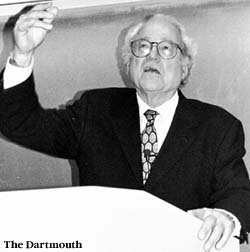
The Dartmouth
PEACEMAKER: Montgomery Fellow Reverend William Sloane Coffin spoke to a crowded house in 105 Dartmouth Hall on Nov. 12.
 |
The Dartmouth PEACEMAKER: Montgomery Fellow Reverend William Sloane Coffin spoke to a crowded house in 105 Dartmouth Hall on Nov. 12. |
Reverend William Sloane Coffin -- international peace activist, former chaplain of Yale University and the inspiration for Reverend Sloane, the character in Garry Trudeau's "Doonesbury" cartoon -- has left quite a mark on the College in his few weeks in Hanover as a Montgomery Fellow.
Famous for his involvement in the civil rights and the anti-Vietnam movement, Coffin, who has received 15 honorary degrees, is a leading proponent of a new political thinking which seeks to emphasize the importance of the environment, social justice and peace.
Since the start of his fellowship on Oct. 20, Coffin, who has a talent for summing up his statements in concise, witty aphorisms, has been giving public lectures -- including ones on homophobia and his Nov. 12th lecture on "The Politics of Compassion" -- to the Dartmouth community.
He has also met with professors, students and administrators in the Montgomery House on Rope Ferry Road, where he and his wife, as well as their Dalmatian "Guy Smiley" and their cat have spent most of the last four weeks.
Coffin, the author of four books, said he has enjoyed and is grateful for the Montgomery Fellowship, because it has given him "the chance to briefly be a part of the Dartmouth community." Of the demands made on his time, he said the fellowship at Dartmouth leaves him with enough time to continue pursuing his own work, "unlike the shameless exploitation he encounters elsewhere."
Although he has attended dinners, lunches and receptions, and has had to spend most of his weekends off campus preaching or working, he has still found the time to spend several hours a day practicing on the baby grand Steinway piano in the Montgomery House.
Coffin -- who is fluent in French, German and Russian -- also said he also has enjoyed spending time at the Hopkins Center and the Hood Museum, as well as watching the bonfire on Dartmouth Night.
Two or three sociology, philosophy, religion or freshman writing classes -- as well as students taking classes on social movements -- generally have come to the Montgomery House every day to participate in discussions. At these sessions, Coffin has provided them with information and the conversation centers on both public and political life, as well as the "individual turmoil" of some of his visitors.
Coffin has discussed choices of vocation with the students, and said seniors are especially anxious about finding "satisfying" jobs. He defined satisfying jobs as those that "don't harm the environment and benefit fellow human beings," such as being a high school teacher.
"There are a lot of good things to do, but it's hard to get paid for them," he said, adding that students are under pressure from their parents and peer groups to choose the right career. Coffin said he can sympathize with dedicated students who "want to be valuable instead of successful."
"There are those who want to make money and those who want to make a difference," Coffin added.
"The level of consciousness of problems and conflicts in the world is very high among most Dartmouth students," he said, "but the level of commitment to solving these problems is something else."
Coffin went on to explain that the situation of the "silent generation" of students in the 1950s, as well as their parents and professors, who were not much different from the students in craving comfort and security, was a case of the "bland leading the bland."
This changed a decade later when the civil rights movement raised the level of consciousness for the wrongs that were occurring in the United States and abroad -- and students became actively involved, he said.
Among today's students, however, he said he perceives a low level of commitment to solving the problems created by inequality. He said Dartmouth interests him as a college and adds that a university's most important commitment lies in teaching its students what to do with their education. "The acquisition of knowledge is second to its use," he said, explaining that the problems of inequality are not caused by ignorance for which education is the answer, but by self-interest.
Coffin said that during his time at the College he has met "very bright students who are profoundly grateful for the chance of a first-rate education and want to express their gratitude by giving something back." In his meetings with students, he has urged them to consider the ethical dimensions of banking and economics.
He also stressed the importance of first-hand experience in dealing with inequality through fellowships or grants. "It is a very important ingredient of education," he said, and added that although he is very appreciative of the high level of education at the College, the learning aspect of experience must be taken more seriously.